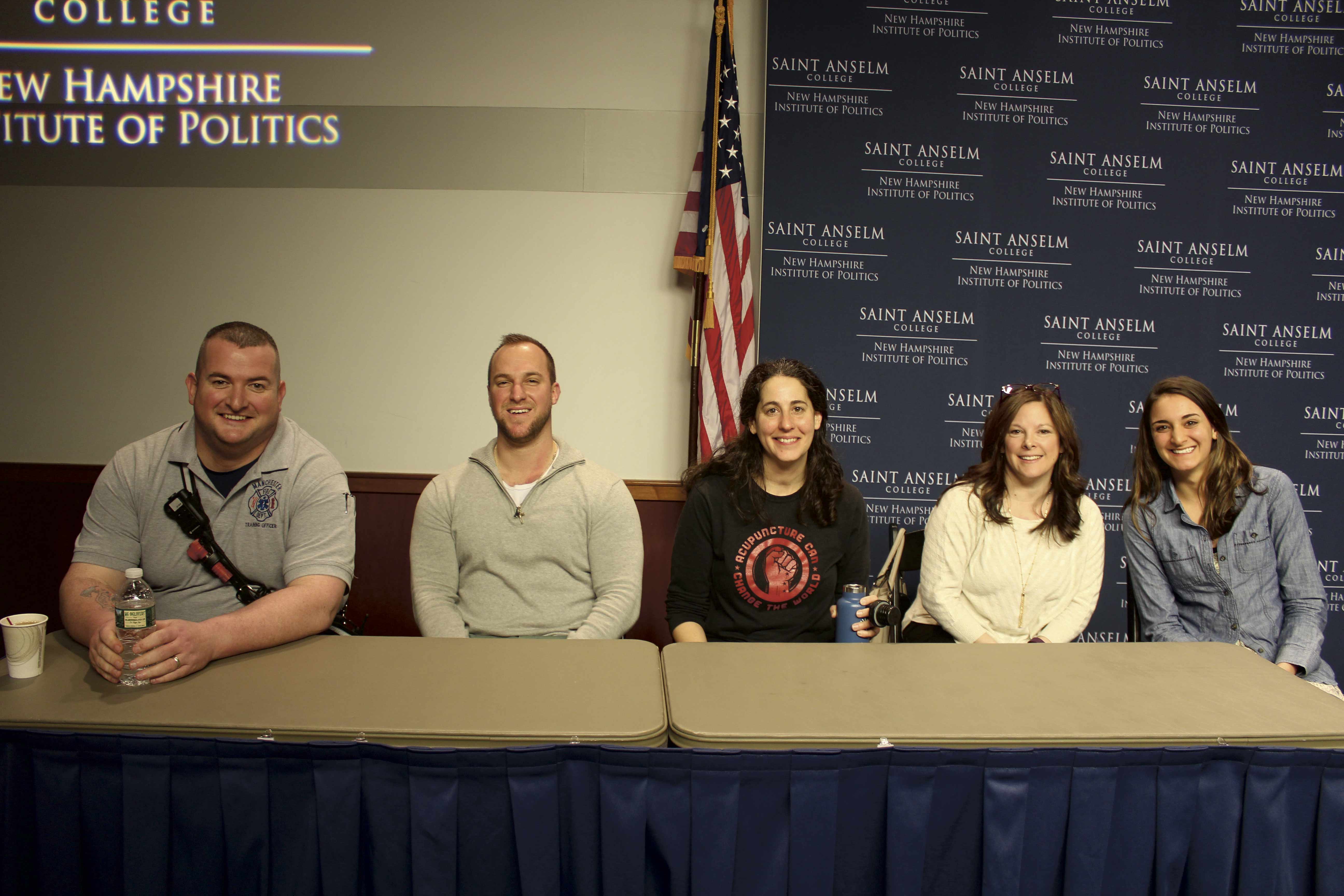Students and faculty rally to discuss the drug epidemic
April 20, 2017
Beginning this year, Saint Anselm College has held a series of events called “Cupcakes and Conversation.” These participatory discussions deal with a variety of topics, from teen homelessness to the stigma of mental illness. On April 3, the Meelia Center, Multicultural Center and the Student Nurses’ Association held one of these events to discuss the topic of addiction, and how it relates to the Saint Anselm community.
Assistant Nursing Professor Ann Fournier told The Crier that Cupcakes and Conversation is a low-key atmosphere that aims to create a comfortable atmosphere for students, faculty and members of the community to converse about important topics. There is typically an event each month that deals with something the students of Saint Anselm feel is relevant to their lives.
This most recent conversation consisted of a panel of people who have been affected by the drug epidemic in the country. Fournier was one of the organizers of this event. She said that this topic was one that was heavily requested by her students.
“The students said they were tired of being lectured at,” Fournier said. “The topic came from the students, I gave a voice to those who wanted to learn about this. I had heard about the Cupcakes and Conversation form and thought we could collaborate.”
So, Fournier worked with Nickie Lora, Assistant Director of Meelia Center for Community Engagement, and Rebecca Senna, Assistant Director of the Multicultural Center. The three of them then worked to train student facilitators and find speakers for the event. They amassed five speakers who each had a unique connection to the drug epidemic. The panelists spoke in the auditorium of the National Institute of Politics to a group of about thirty-five students.
The first panelist was Chris Hickey, a firefighter and paramedic for Manchester. In his twenty years of work, Hickey said he has seen hundreds and hundreds of drug overdoses. According to Hickey, this inspired him to create a Safe Haven plan for drug addicts in the area. He said he modeled it on the law that states that any mother can leave a baby at a firehouse where it will be cared for with no repercussions. In this scenario, drug addicts can go to any firehouse for help and receive it.

Left to right: Chris Hickey, Sean Mattos, Elizabeth Ropp, Heather Souther,and Elaina DeMello .
Sean Mattos is a former drug addict who now works to help others suffering from addiction. “I’m not a clinician or a therapist, I work for a developing program and piece together programs that will work for each client,” Mattos said. “I was able to take everything I learned in treatments and I was able to develop some programs.”
Elizabeth Ropp spoke about her career as a licensed acupuncturist, and how acupuncture can be used to treat those struggling with drug addiction. She also spoke about how her job is leading her to push for legislation to approve acupuncture detoxification training to non-licensed acupuncturists in New Hampshire.
“There are twenty-three states in the country that allow EMTs and other medical health professionals to practice as acupuncture detoxification specialists,” Ropp said. “New Hampshire is not one of them. If only licensed acupuncturists can practice this then it will cost sixteen times as much.”
Heather Souther detailed how her career as a licensed mental health professional also helps addicts. Her goal was to go beyond the physical side of addiction, and instead help the entire patient. “I like to treat the whole person,” Souther said. “Some therapists say they won’t treat you until you’ve gotten yourself clean, but I believe you have to work with both sides of the person.”
Last to speak was Saint Anselm alum Elaina DeMello. DeMello graduated in the year 2016 as a nursing major, and she now works in the Emergency Room of Elliot Hospital in Manchester, NH. DeMello talked about her experience as a nurse, and how she has seen the effects of the drug epidemic first hand.
“I see a lot of overdoses come in,” DeMello said. “I think the thing that gets me the most is that people come in and they want help, but they just slip through the cracks. We don’t have the resources or the time that we need to really help them.”
After introducing themselves, the panelists walked among the tables in the auditorium and spoke more intimately to the students about their connections to this topic. After about an hour the entire group came together again to go over what had been learned.
The opioid epidemic has been a major issue in New England for many years. However, it appears to not have fully infiltrated the campus. Maura Marshall, member of Saint Anselm’s health services, the chairperson of the school’s Alcohol and Drug Committee, and retired EMT says that it has mostly affected students who have family members who become addicted.
“Recently, our 2017 NH Higher Ed AOD survey, in which 415 students responded to our opiate question, less than 2% of our students had ever used a non-prescribed opioid,” Marshall said. “The drugs of choice on our campus are alcohol and marijuana. I think the good news in all of the attention to the opioid epidemic, is that more funding is being allocated for prevention and treatment of substance abuse.”
As for Cupcakes and Conversation, Lora said she wants it to continue on into next year and cover an even wider variety of topics. “This is a program we’ll continue and hope will grow.


